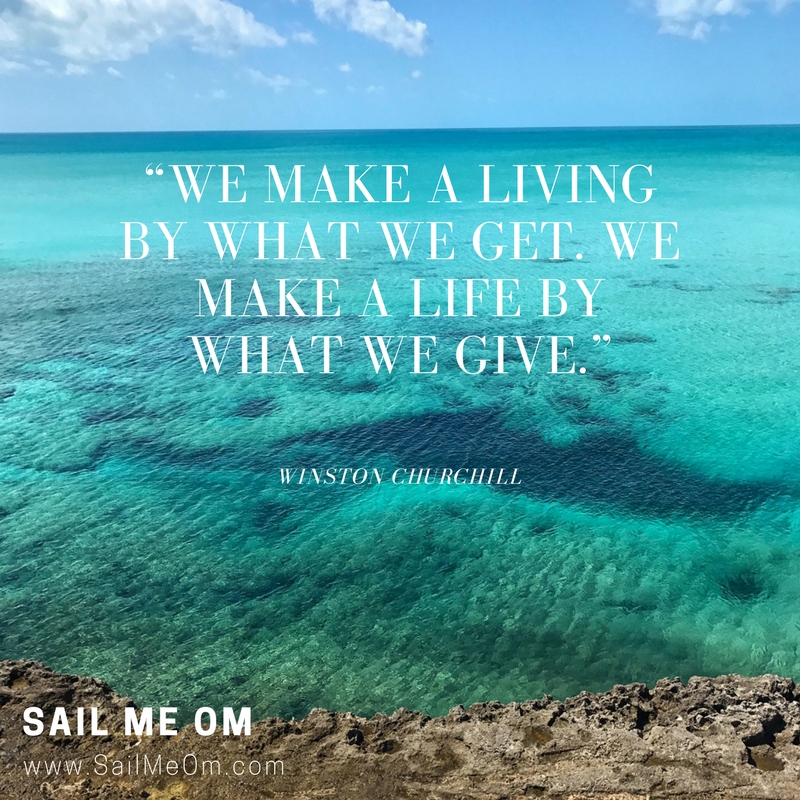Greetings from Puerto Rico! Our little boat has made it a few hundred miles since I last checked in, slowly working and sailing our way through the Bahamas, across Turks and Caicos, bashing along the Dominican Republic, and finally landing at south coast port of Salinas.
It's time for a land break while we wait out hurricane season, which has given me a chance to reflect on how this weird watery life has changed me since we left New York a few thousand miles and more than a year ago.
One thing has become clear: Traveling through the islands has made me a kinder person. That's making life, wherever I go, infinitely better.
As I took a break from the Caribbean to visit favorite cities and friends, I noticed everyone, especially strangers, were more open to me. They were friendlier, ready for conversation, to lend a hand.
In my first few days back in the States, I was confused.
People were saying hello in the street, striking up conversations with me in lines, helping me fix and unload and arrange things... those nice things you do for people where everyone knows each other. They were offering kind smiles and human acknowledgement.
This wasn't unusual per se -- we have passed the last seven months living in a chain of islands where this is the norm. Where everyone stops to help someone else, because you know the smallest acts can make a huge difference to someone's livelihood, safety or ability to withstand the elements. Where everyone is kind to each other because you know you'll see them again.
Except, I was in Baltimore and LA. These are places I know well, where I have spent lots of time without anyone saying hello meeting me in the eye. What was going on? My big city suspicions were raised. Why were all these strangers being so nice to me? Why was this thing or that thing being offered? What was the catch?
Then it dawned on me: The world hasn't become kinder, but I have. And when I approach the world with openness and warmth, the world returns it joyfully.
It's not you, It's me
Stay with me here, while I get a little woo woo on you. You can't travel to as many odd places as I have without being willing to befriend strangers and roll with weird invitations and situations.
But in terms of kindness, I've undergone my own evolution.
As a student, I learned to harden myself so that I wasn't taken advantage of.
As a woman, I learned to never hold anyone's gaze or participate in conversation long enough to encourage any undesired actions.
As a New Yorker, I learned that my best friends were my resting bitch face and a pair of headphones.
That's not to say that I haven't been a practitioner of kindness. I've been a longtime believer in Radical Empathy, and my belief in empathy and conflict resolution has driven me to great lengths in my professional career -- to build a nonprofit that taught storytelling in conflict zones. To help grow a media startup that builds empathy through viral storytelling. To seek out 10 years of work that benefits social good.
But I've been pretty bad at practicing it in my everyday life.
Until this last couple of years, my main approach to the world has been, with reason, one of self-defense and skepticism. I'd like to say I've always practiced kindness, but almost exclusively to the people I already know or toward causes I've felt passionate about. That left my circle of friends small and tight, and my daily interactions almost exclusively transactional.
Somehow, more than a year of cruising through small towns and seven months of living in the islands has worn down my defenses like waves on sea glass. And I'll be the first to admit that the softer-edged me is way better.
Someone else won't do it
One of the biggest lessons I learned from traveling to remote locations is to reprogram my brain from the default big-city idea that there's always a "someone else". When you're on an island in the middle of the ocean, exposed to elements and limited resources, there are few "official" modes of help, in emergencies or otherwise. You can look around you, on land or in an anchorage and realize, this is it. These four or five boats, or this town of 500 people is all we've got to solve a problem. There is no one else. So every person who looked stuck, struggling or asked for help was suddenly my problem. No person left behind.
That seems like a hassle, but it's actually a lovely way to approach the world. You can address any situation with the certainty that you're there exactly at there right time to help someone else. And they're there to help you.
My change in my own attitude became clear to me back in Georgetown, in the Bahamas. While hiking with some cruising friends and some other folks visiting from New York, we came across an older fellow who was clearly struggling in the heat. We asked if he was okay. He waved us off and told us he was just taking a rest.
Our New York friends continued on, satisfied that he could take care of himself. The rest of us stayed put, gave him some food and water, slowly walked him back to his dinghy, and made sure he got back to his own boat all right, where his wife was waiting for him.
We talked about it later -- this wasn't a classic case of Bystander Effect and the New Yorkers weren't wrong in their actions, per se. He had said he was fine. But we knew that there might not be another person coming by the rock on which he was sitting. That no EMT could be quickly called if things escalated. All that guy had was us, who happened to come across him at just the right time.
When you know there's no one else, you have no choice but to start watching out for each other.
I've also found that moments like these always come back around.
When we returned to Luperon in the Dominican Republic late one night from a trip to the States, our pre-arranged dinghy ride to our boat was nowhere to be found. We stood on the dock with our bags, our dog and the fatigue of 12 hours of travel. It was midnight, in a tiny seaside town that spoke exclusively Spanish, and it looked like the only way to get to our boat was going to be to swim. We asked around at a few bars that were still open, but no one had a boat. So as a last-ditch effort, we borrowed a VHF radio and called,
"General announcement to the harbor: Is anyone still awake and willing to swing by the dock to take us to our boat?"
A woman immediately hopped on the radio and, without knowing who we were or any details, said she'd be out in five minutes to pick us up. And just like that, we were home.
I have stopped asking myself: Is there anyone else coming that would be better equipped to deal with this?
Instead I step forward with good intentions and the best I can do, and hope that other people around me will follow. They almost always do.
Make time for kindness
These moments of kindness aren't always ones of trauma or emergency. Most of the time, practicing kindness is being generous with your time: taking an extra five minutes to lean into a conversation instead of shut it down, to compliment people and get to know them a bit better, or to offer or listen to some advice.
Part of adjusting to a tropical clime is learning to slow down. And in that slowness, you finally have room for those little niceties that make the world so much more pleasant.
That's hard to do while working, where people don't understand that even if you're not in an office that doesn't mean you don't have a full workday. I've put it upon myself to schedule in that time.
I no longer schedule back to back calls if I'm in a new public place, as I'll need to have time to get to know the people who run the restaurant, bar or coffee shop I'm in.
I leave an extra five to 10 minutes to get anywhere, as I know I'll probably get roped into some kind of conversation along the way.
I can't schedule my days with the precision I had in New York or LA, but getting through the day is so much easier and more fun, knowing that I can spare the time to get to know everyone around me and explore the places that I'm in.
The more you give, the more you get
By opening myself up to help and leaving more space in my day for kindness, I've also found that I've become less suspicious around new people.
I haven't lost my skepticism toward other people's intentions but I have forced myself to stop assuming that strangers are a threat. Men aren't always there to catcall me, vendors aren't always there to hustle me.
This manifests in my attitude in small ways: I make eye contact with everyone I meet, and I greet them with a hello and a smile if they choose to make eye contact back. If you're from a small town, you're probably rolling your eyes right now, and I get it. But for those of us who have spent most of our lives in big cities, eye contact with strangers is a radical move!
I've lost my automatic "no to the universe" vibe, and in return, I think my good intentions come back around more often. I think my openness shows on my face and from it, I've been party to a million small interactions that have made my days more fulfilling.
I'll never be good at improv, but I like to think of my attitude as shifting toward a "yes, and" mentality that allows me the space to better understand the people around me and my place in the world.
Karma is a boomerang
Traveling basically full-time means that I can't get deeply involved in one community, but I can make myself available for a thousand small interactions that can make a difference to someone else. I also try to participate as much as possible in online groups for people asking for help and advice, trying always to give more than I get.
That phrase, "Karma is a boomerang" is one of my favorite phrases. As a teenager, I wrote it on a post-it and stuck it to a mirror in my bedroom. I used to love it because I knew that anyone who did me wrong would have their negativity served back to them, with sprinkles on top one day. I took great delight in imagining the cosmic revenge of the bullies and mean girls of my earlier years and how much better off I'd be. I brought a lot of that attitude into my adult life, with the underlying intention of "not being mean, rude or awful" instead of actively and intentionally practicing kindness.
But as I've gotten older, I've come to think about karma far less in terms of retribution, and instead in terms of all the good energy I can put out into the universe and the myriad ways I can do it.
It's not always easy. But even objectively, the time and effort is worth it. Studies have shown that people acting generously toward others find more happiness in their own lives than those acting in their own self interest.
Generosity can take a lot of different forms, and I've really enjoyed exploring what generosity means to me, especially in the time and love I reserve for others.


